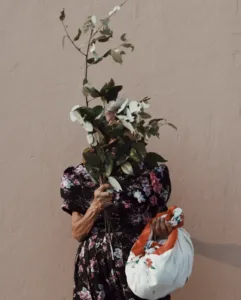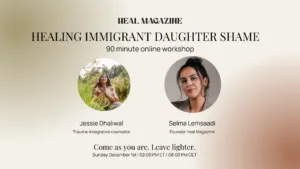As both a licensed trauma therapist and the daughter of immigrant parents, I can relate to a topic that comes up often in therapy: shame. Working with children of immigrants, I am familiar with the shame that accompanies the struggles of biculturalism. Healing this shame can take different forms, and here are five options to try.
Talk about the secrets in safe spaces
Shame grows in secrecy, and giving shame a voice untangles it from fear and helps it shrink. Many daughters of immigrant parents are told to keep perceived family shortcomings a secret. This secrecy is often internalized, and we start leading a double life or showing only parts of ourselves that we think will be acceptable in certain spaces. We grow up being one version of ourselves with family, a completely different version with friends, and yet another version at work. Having safe spaces where we can show all of our parts is important for healing the shame around our secrets. Therapy may be a safe space, as it is confidential, or you may have safe family members or friends.
Find spaces with common humanity
We heal in community, especially with those who have similar experiences. Hearing about other people’s shared experiences of shame can help us dismantle the judgments that we are making on ourselves.
Untie your worth from past decisions
Many daughters of immigrant parents tell me about the rigid boundaries they had growing up and the ways they navigated them. Oftentimes we lied about our whereabouts and company—we lied to our parents to participate in certain leisure activities and to date. Healing means forgiving these younger versions of yourself with love and understanding. You did what you needed to do to navigate a bicultural identity, and those lies do not define who you are.
Give yourself grace around making mistakes
We are often quick to forgive others and do not extend that same compassion to ourselves. Healing from shame means loving ourselves with the same grace we would give a close friend. As daughters of immigrant parents, we often experienced rigid rules or high standards and extended those standards to ourselves. Healing means giving yourself the flexibility and understanding your inner child needed growing up.
Find a therapist who understands your cultural upbringing
Sometimes we need professional support to heal from our intergenerational shame. I am a therapist who goes to therapy myself in order to provide support from my most healed space. I have worked with over a dozen therapists and supervisors in my healing journey and career. In my professional opinion, it is important to find a therapist who uses cultural humility or understands your culture. You do not want to spend paid time explaining to your therapist why you carry cultural shame. Instead, you want to spend this paid time unpacking and integrating your shame shadow.











